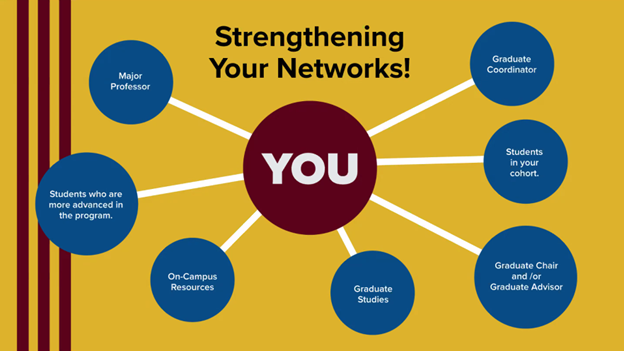Research shows that positive mentor-mentee relationships benefit graduate student success and well-being. Graduate students also benefit from multiple mentors and should create a mentorship network to guide them during graduate school. Rather than seeking comprehensive mentorship from one sole mentor, graduate students can benefit greatly from creating a collective of mentors to guide them on their various needs and goals. Below are important milestones of your graduate school journey at which you grow your mentorship network, with both student and faculty perspectives for how to succeed in forming the relationship.

Types of Mentors and Mentorship
Many graduate students enter graduate school imprinted with the experience of their undergraduate programs. While undergraduate programs are typically very structured and centered on a progression of coursework, graduate school is centered on learning to perform independent research, which can feel very unstructured and isolating.
There are two main steps to developing an expanded mentoring or developmental network: one is to assess your needs and what gaps you are experiencing in your mentoring, and the other is to find out where you might find such mentors at UC Davis. Brigham and Women’s Hospital has developed an exercise to help guide the process of creating a developmental network.
Finding mentors to address various needs may require making your way to new parts of campus you have not yet explored.
- Graduate Advisor
- While the program assigns Graduate Advisors to assist students with course selection and administrative tasks such as signing forms, Graduate Advisors can also be a sounding board for major professor selection, and handling delicate situations with faculty.
- Major Professor
- Also often called “PI” (from the term “Principal Investigator”, a term used by NIH and NSF for grantees), the Major Professor is central to developing your research acumen and navigating the start of your research career.
- Dissertation/Thesis Committee
- Typical dissertation or thesis committees are chaired by the Major Professor, and include two other faculty who can help advise the student. The Dissertation or Thesis committee is generally established at the time of Advancement to Candidacy, and in consultation with your Major Professor. After advancing to candidacy, regular meetings with the whole dissertation committee helps assess progress towards completion, including ensuring that the scope of the work is appropriate to a dissertation.
- Academic Mentorship
- There are mentors who might have special insights into aspects of your academic or research life not captured in your existing advisor or thesis committee. They might be faculty you meet in class or at seminars, or in graduate group activities such as committee work, colloquia, or campus professional development workshops.
- Career Mentorship
- These are mentors who have career experience outside of the ones represented in your existing mentors. It could be a career advisor at the Internship and Career Center, a presenter in the Grad Pathways Institute, an alumnus of MCIP in the MCIP LinkedIn group, or a professional already in your field of interest. The FUTURE network maintains a list of PhDs who work outside of academia, and have agreed to offer mentoring to graduate students.
- Personal and Community Mentorship
- These are mentors you turn to for personal support and validation. You may be the first in your family to attend college (let alone graduate school), and you might benefit from the UC Davis First Gen initiative to identify first-gen staff and faculty available for support. You may have grown up in a cultural environment very different from UC Davis or MCIP, and might seek out faculty or staff who share that with you, whether through the Cross-Cultural Center, or the Services for International Students and Scholars. Attending open houses, events, and socials, may help you identify additional personal support mentors.
